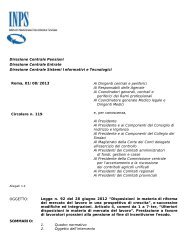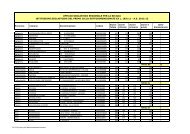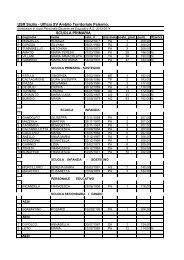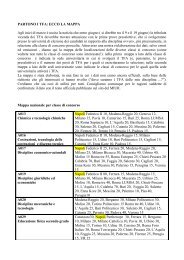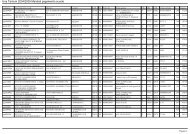Analisi - knowledge management case studies - Aetnanet
Analisi - knowledge management case studies - Aetnanet
Analisi - knowledge management case studies - Aetnanet
Create successful ePaper yourself
Turn your PDF publications into a flip-book with our unique Google optimized e-Paper software.
elated set of topics, part of their discipline. For example, the drilling engineers part of the<br />
wells network are discussing about drilling ‘ultra slim’ holes and the people who purchase<br />
drilling related equipment discuss their topics in their part within the same network. The<br />
people joining a network are sometimes part of the core network and sometimes in the<br />
periphery of the network and jump in whenever something that draws their attention comes<br />
by. In order to ensure that the community remains active a moderator provides support. In<br />
many <strong>case</strong>s a moderator moderates between 1 – 3 days each week. The most successful<br />
larger networks have a fulltime moderator, funded by the Operating Units with a major<br />
interest in the business processes discussed in the network. The moderator is:<br />
the ambassador and marketeer of the community;<br />
the community builder;<br />
responsible for creating and maintaining momentum in the community;<br />
managing, sometimes even editing the content;<br />
ensures questions get answered;<br />
and requests (and chases) for contributions.<br />
The best expert is usually not the best moderator: other people may stop contributing if a<br />
moderator keeps adding comments to contributions from others.<br />
In larger, globally operating, networks three other roles are identified to support the<br />
community: a Subject Focal Point, moderating a part of the network, Local Coordinator<br />
energising all the members in his/her Operating Unit and a Global Coordinator acting as<br />
chairman and energiser for the total community. For an explanation of their necessity and<br />
their tasks is refered to the section called: Errore. L'autoriferimento non è valido per un<br />
segnalibro. - Implementing new organisational structure slowly.<br />
Appraisal system<br />
People do get recognised in a community by their contributions and by exposing their<br />
<strong>knowledge</strong>. This can occasionally contribute to financial rewards: a promotion can be<br />
triggered by the reputation contributors have built up in their community. It is obvious that if<br />
people are able to see these tangible benefits of sharing their <strong>knowledge</strong>, they will become<br />
more inclined to change their behaviour accordingly.<br />
• By observations it was discovered that there is a culture arising within Shell, where<br />
people are saying ‘I didn’t invent this myself, I took ideas from him.’ Using ideas from<br />
others starts being encouraged and is popping up in some appraisal systems within<br />
individual operating companies. In these companies it is more beneficial for an<br />
individual to search for solutions already available, solicit suggestions and to admit<br />
that you have used someone else’s idea instead of developing your own solution. In<br />
some parts of the company the appraisal systems contain elements related to<br />
publishing information and to assisting others.<br />
•<br />
• Comparing individual Shell companies or business units merely on their own bottom<br />
line performance can be a hindering factor in <strong>knowledge</strong> sharing – sharing<br />
information reduces the competive advantage of an individual company in<br />
comparison to their peers within the Shell Group. This is to be compensated by<br />
including elements in the comparison as “total contribution to the Shell Group”,<br />
“implemented innovations by and from other companies”.<br />
Processes<br />
Best Practice Transfer<br />
In 1997 they tried a classical Business Process Benchmarking approach (some other oil<br />
companies work this way). Which means taking business processes of exploration and<br />
production, then step by step defining performance indicators for the various process parts,<br />
analysing the process parts of the various Shell operating companies and comparing them.<br />
Trying to explain the differences between good and bad performing operating companies,<br />
then describing the ways of work of the best performing operating companies and transfer<br />
this information to mediocre performing operating companies. This didn’t work at a global<br />
scale for several reasons; the formal taste of it all was not accepted by the operating<br />
companies.<br />
CIBIT 40<br />
analisi-KM <strong>case</strong> <strong>studies</strong>.doc - 25/5/99






